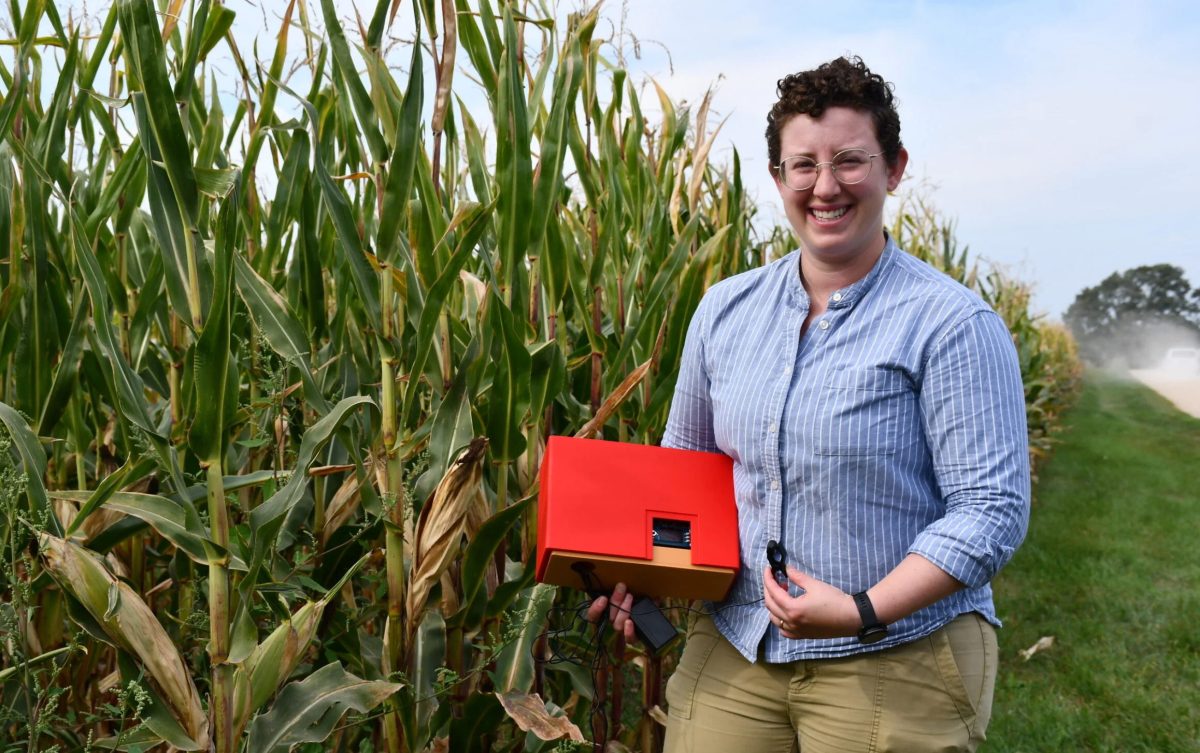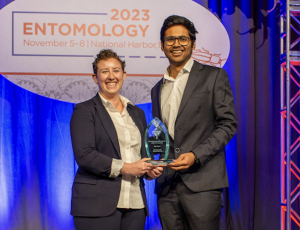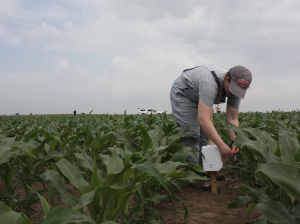
It is hard to find anyone who knows more about insects than Emily Bick. Not only does she possess an award-winning encyclopedic knowledge of insect trivia, but she has an extensive understanding of how bugs impact us (Entomological Society of America 2016 and Bick Lab Website 2025). Emily’s interest in bugs has always centered around their interactions with humans (Wiessing 2023). Her first introduction to innovation in the bug world was a high school project attempting to make a more powerful bug spray. This research helped her make her first contacts in the entomology community.
Her passion continued into college and grad school where she researched how bugs were building an immunity to pesticides. Through her projects and working with farmers along the way, she began exploring how farmers could achieve better pest control by optimizing their ecosystems (Wiessing 2023). During her postdoc at the University of Copenhagen, Emily created methods for farmers to redesign their apple orchards so that they were more resilient to pests, creating sustainable production (“UC Davis Alumnus Emily Bick” 2020). At UW–Madison’s Bick Labs, Emily has studied how pests contribute to crop loss and how plant diversity can discourage pests, as well as developed new techniques to manage pest control (Bick Lab Website 2025). Because pests consume 20-40% of global crop production every year (Gula 2023), Emily’s work is critical to global food supply and sustainability.
For her critical research, Emily needed a way to measure pest activity on a large scale—looking beyond specific species to determine a given area’s diversity (Wiessing 2023). There were a few options for tracking pest volume, but all of them had major flaws, such as being extremely time intensive, requiring a large amount of highly skilled labor, or only capturing data at set times or point measurements. The biggest drawback to these solutions was that they often involved destroying plants, which created an economic burden for growers—the very action her research aimed to prevent (WARF 2023). Emily needed a more effective way to track pests to meet her research goals.
When she came to UW–Madison, she thought about how to develop a less time consuming, less destructive, and more affordable tracking method (Bick 2024). Inspired by spy movies and guitar tuners, Emily put together the first version of her solution: a small sensor that could be clipped to a leaf. The sensor picked up and documented vibrations in its environment and stored that data. A machine learning algorithm could then determine which type of insect activity was occurring in that part of the field (Tran 2024). Her innovation provided her with the level of data needed to conduct her research.

Helping her was Dev Mehrotra, a UW–Madison graduate student in Computer Science. Through their collaboration and his computer science background, Dev created the first version of the Insect Eavesdropper (Entomology Today 2024). Dev had a bigger vision for Emily’s innovative design and pursued what an Insect Eavesdropper program might look like. Dev and Emily joined the UW–Madison Local NSF I-Corps™ program for the Fall 2023 Cohort, where they kickstarted their customer discovery journey. Through the program, the team gathered feedback from potential users. Dev then competed and placed in the 2024 Governor’s Business Plan Contest (Wisconsin Governor’s Business Plan Contest 2024), brought the idea to the World Agri-Tech Innovation Summit (World Agri-Tech 2024), and won first place in the Entomological Society of America’s Antlion Pit Competition (Mehrotra 2023).
Having a startup in her lab has helped Emily in three main ways.
First, Insect Eavesdropper has significantly increased the visibility of her lab, keeping her top-of-mind when new research, funding, or collaborative opportunities arise. Insect Eavesdropper gained national attention when Emily’s projects were featured on NPR’s Short-Wave podcast. It also received spotlights in publications including the Wisconsin Public Radio, The Field Notes Podcast, and the Daily Cardinal.
The second major impact has been funding and collaboration opportunities. Due to the large network created through the customer discovery efforts in the I-Corps program, the Bick Lab has around two calls a week with potential collaborators or investors. Showing prototypes at the AgriTech Innovation Summit has also led to many companies seeking partnerships or collaborations. Additionally, the lab received a WARF phase 1 Accelerator grant, allowing them to bring in a data science consultant and a part-time postdoc (Bick 2024). These industry partnerships have granted access to data to improve her models, which allows further refinement, expanding which species the insect eavesdropper can identify, and ultimately increasing their scope of study (Bick 2024).
 The final impact is building up her lab’s graduate students. Having graduate students go through I-Corps was a wonderful way to provide them with entrepreneurial training. Working on the sensor also broadened graduate students’ horizons by pushing them to interact with individuals who most needed the technology. When asked what she would say to a PI considering whether to let their graduate students pursue entrepreneurship opportunities, Emily said, “As principal investigators, our role is to support our students in their career path pursuit. While we focus on topical or research mastery, we also equip students with broader, transferable skills—such as problem solving and communication. If a student shows strong entrepreneurial interests, we should nurture their skillsets in support of their ambition.”
The final impact is building up her lab’s graduate students. Having graduate students go through I-Corps was a wonderful way to provide them with entrepreneurial training. Working on the sensor also broadened graduate students’ horizons by pushing them to interact with individuals who most needed the technology. When asked what she would say to a PI considering whether to let their graduate students pursue entrepreneurship opportunities, Emily said, “As principal investigators, our role is to support our students in their career path pursuit. While we focus on topical or research mastery, we also equip students with broader, transferable skills—such as problem solving and communication. If a student shows strong entrepreneurial interests, we should nurture their skillsets in support of their ambition.”
She also emphasized that pursuing these entrepreneurship opportunities complements graduate students’ progress in their programs, helping them achieve their goals and providing entrepreneurship opportunities that still align with the research goals of the lab. Emily encourages those who see an opportunity to pursue entrepreneurship to ask. “One of the best pieces of advice I have received is: you get 0% of the grants you don’t apply for. The same goes for career opportunities—your PI can’t support goals they don’t know about,” she said. Any graduate students preparing to make this request of their PI should come with specific programs or opportunities of interest and a clear explanation of why they will support professional development and program progress.
Now, Emily is working with over 25 collaborators across the world on projects such as Maldives Space Research Organization’s Coconut Hispine Beetle monitoring and tracking cornered alfalfa weevil in Sonoma vineyards. None of this would have been possible for Bick Lab without the hard work of her innovative team in developing and commercializing the Insect Eavesdropper.
Written by: Emma Uren
• • •
Feature image: University of Wisconsin-Madison entomologist Emily Bick invented the “insect eavesdropper” to spy on pests as they destroy crops. Photo by Mackenzie Krumme/WPR.